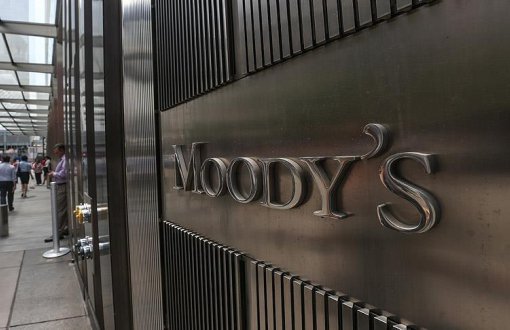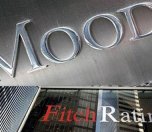Click to read the article in Turkish
Credit rating agency Moody’s has lowered Turkey’s credit rating to Ba2 from Ba1, and changed its outlook from “negative” to “stable”.
In Moody’s written statement, two factors involving political and financial situation came to the fore.
First driver: Continuing erosion of institutional strength
“The ongoing weakening of Turkey's credit profile continues to be primarily driven, as it has over the past four years, by the deterioration in the country's institutional strength. The government appears still to be focused on short-term measures, to the detriment of effective monetary policy and of fundamental economic reform.
“Faltering institutional strength is reflected in a broad range of adverse outcomes on the economic, financial and political front despite strong near-term growth rates and healthy public finances. Inflation has stayed stubbornly in the double digits -- the highest inflation rates seen in nine years. It is unlikely to fall to single digits on a sustained basis until 2020 at the earliest. Both the 2018-20 Medium Term Program as well as the 11th 5-year National Development Plan, which will start next year, assume average inflation consistently above the central bank's medium-term inflation target of 5%. The explicit tolerance of high inflation in these plans demonstrates the priority accorded to short-term growth regardless, it appears, of the medium-term consequences.
“The erosion of Turkey's executive institutions has continued with the government's ongoing activities to remove suspected sympathizers with the Gülen movement blamed for 2016's coup attempt and the ongoing state of emergency. The undermining of the authority of the judiciary is illustrated by the government's refusal to honor a Constitutional Court ruling to release certain political prisoners, and a lower court later sentenced the prisoners to life terms in prison. Deep divisions in Turkish society were evident in the campaign before the referendum on the constitutional amendments last April and the vote itself. Those amendments -- which will eliminate the office of the prime minister and very significantly expand the authority of the president when they become effective next year, with limited checks and balances -- are likely to undermine the predictability and therefore the effectiveness of policymaking.
“Moreover, while the authorities have registered some successes on the structural reform front, such as auto-enrollment in company-run pension plans, legislation to restrict foreign currency lending to companies and the recent submission of a draft value-added tax reform to parliament, progress has been slow to date. Government officials continue to postpone the implementation of more comprehensive structural reforms, such as to address rigidities in the labor market, in advance of the 2019 elections. As a consequence, while growth has exceeded expectations in recent months, medium-term growth expectations remain below historical experience and imbalances are growing, as evidenced by the large current account deficit and double-digit inflation. While the fiscal deficit and the government's debt burden remain contained in the near-term, the willingness to support short-term growth through fiscal stimulus rather than through more sustainable economic reform signals future fiscal challenges. And, although the unemployment rate has dropped since 2016, it remains high at about 10%, with the jobless rate among youth twice as high.
Second driver: Increased risk of external shock due to high external debt and political risks
"Set against the negative institutional backdrop, Turkey's external position, debt and rollover needs have continued to worsen. Although the government's own external borrowing needs are relatively low, the country as a whole has very large external financing needs given sizeable current account deficits, maturing long-term debt and high levels of short-term debt. This external exposure has continued to grow over the past year and is expected to continue to do so. The country's foreign exchange buffers are very low compared to these needs; the country's External Vulnerability Indicator is expected to rise to well over 200%, which is extremely high in comparison to Turkey's rating peers, and signals an ever-rising exposure to changes in international investor sentiment.
"The potential triggers of a re-evaluation of Turkish country risk by foreign investors continue to multiply with the continuing deterioration of Turkey's geopolitical situation, its already strained domestic politics and the prospects of monetary policy tightening in the more developed economies. Amplifying its vulnerability to external shock are Turkey's political risks, with the convergence of risks from the geopolitical arena and domestic politics. On the domestic front, as described above, the government's legal crackdown since the failed coup in July 2016 has taken a negative toll on the investment climate and relations between Turkey and the US and EU.
"In Moody's view, the geopolitical risk arising from Turkey's recent engagement in Syria becomes more marked the longer and deeper the engagement goes on. Turkey's involvement in the Syrian conflict and battle against ISIS spilled over into heightened domestic terrorism in recent years, which has been damaging to tourism and hence economic stability (tourism being an important source of export revenues) and confidence. While tourism is now reviving strongly, the full normalization of the sector remains vulnerable to political and security risks.
"This overall picture suggests that the possibility of a sudden, disruptive reversal in foreign capital inflows, a more rapid fall in already inadequate FX reserves and, in a worst-case scenario, a balance of payments crisis, while still quite low, has increased beyond Moody's expectations a year ago. The larger the external indebtedness becomes, the less comfort can be taken from the country's historical ability to attract large amounts of foreign capital, and the greater the exposure to shifts in investor sentiment due to political risks or global monetary tightening. Such shifts could also worsen the quality and shorten the maturity of such capital inflows, a trend already witnessed in 2017". (PT/TK)








